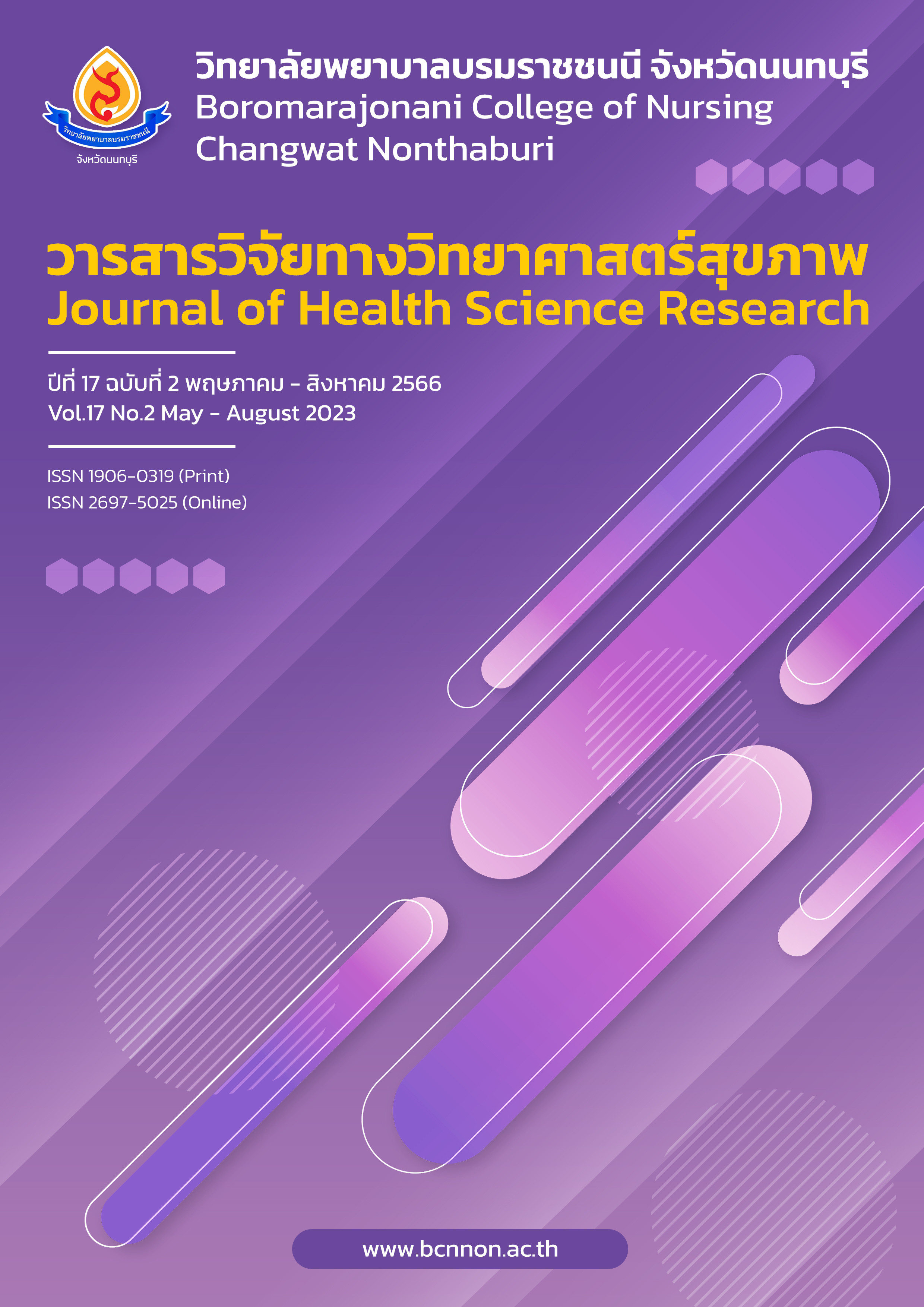ผลของโปรแกรมส่งเสริมการรับรู้ตนเองต่อความสามารถของผู้ดูแลในการล้างจมูกเด็กป่วยที่มีภาวะน้ำมูกคั่งค้าง
Main Article Content
บทคัดย่อ
บทนำ : ภาวะน้ำมูกคั่งค้างพบมากในเด็กเล็กที่ป่วยด้วยโรคทางเดินหายใจส่วนบน ส่วนใหญ่รักษาด้วยการรับประทานยาร่วมกับการล้างจมูก ปัญหาคือผู้ดูแลขาดความมั่นใจในการล้างจมูกและไม่มีประสบการณ์ล้างจมูกมาก่อน ดังนั้นการส่งเสริมการรับรู้ของผู้ดูแลในการล้างจมูกเด็กที่มีภาวะน้ำมูก คั่งค้าง ส่งผลให้ผู้ดูแลมีความมั่นใจในการล้างจมูกเด็กมากยิ่งขึ้น
วัตถุประสงค์ของการวิจัย : เพื่อศึกษาผลของการใช้โปรแกรมส่งเสริมการรับรู้ตนเองต่อความสามารถของผู้ดูแลในการล้างจมูกเด็กป่วยที่มีภาวะน้ำมูกคั่งค้าง
วิธีการวิจัย : การวิจัยกึ่งทดลองแบบกลุ่มเดียววัดผลก่อนและหลัง ตัวอย่างเป็นผู้ดูแลเด็กป่วยที่มีน้ำมูกคั่งค้างที่มารับบริการผู้ป่วยนอกกุมารเวชกรรม สถาบันบำราศนราดูร จำนวน 35 ราย เครื่องมือที่ใช้ในการวิจัย ประกอบด้วย โปรแกรมส่งเสริมการรับรู้ตนเองของผู้ดูแลในการล้างจมูกเด็กป่วยที่มีภาวะน้ำมูกคั่งค้าง แบบบันทึกข้อมูลทั่วไปของผู้ดูแลและเด็กป่วย แบบสอบถามความสามารถของผู้ดูแลในการล้างจมูกเด็กป่วยที่มีภาวะน้ำมูกคั่งค้าง วิเคราะห์ข้อมูลโดยใช้สถิติเชิงพรรณนา และทดสอบค่าที
ผลการวิจัย : ภายหลังเข้าร่วมโปรแกรมฯ ผู้ดูแลมีความสามารถในการล้างจมูกเด็กป่วยที่มีภาวะน้ำมูก คั่งค้างสูงกว่าก่อนเข้าโปรแกรมอย่างมีนัยสำคัญทางสถิติที่ระดับ .05
สรุป: โปรแกรมส่งเสริมการรับรู้ตนเองสามารถนำไปใช้กับผู้ดูแลเด็กป่วยที่มีภาวะน้ำมูกคั่งค้าง เพื่อส่งเสริมให้ผู้ดูแลมีความมั่นใจและสามารถล้างจมูกเด็กป่วยได้ด้วยตนเอง
Downloads
Article Details

อนุญาตภายใต้เงื่อนไข Creative Commons Attribution-NonCommercial-NoDerivatives 4.0 International License.
บทความที่ได้รับการตีพิมพ์เป็นลิขสิทธิ์ของวิทยาลัยพยาบาลบรมราชชนนี จังหวัดนนทบุรี
ข้อความที่ปรากฏในบทความแต่ละเรื่องในวารสารวิชาการเล่มนี้เป็นความคิดเห็นส่วนตัวของผู้เขียนแต่ละท่านไม่เกี่ยวข้องกับวิทยาลัยพยาบาลบรมราชชนนี จังหวัดนนทบุรี และคณาจารย์ท่านอื่น ในวิทยาลัยฯ แต่อย่างใด ความรับผิดชอบองค์ประกอบทั้งหมดของบทความแต่ละเรื่องเป็นของผู้เขียนแต่ละท่าน หากมีความผิดพลาดใด ๆ ผู้เขียนแต่ละท่านจะรับผิดชอบบทความของตนเองแต่ผู้เดียว
เอกสารอ้างอิง
Sonthimuang S, Santat S, Orathai P, DaramasT. The Efficacy of oropharyngeal and nasopharyngeal suctioning by using MU-TIP on premature infants receiving nasal continuous positive airway pressure ventilatory support. Journal Ramathibodi Nursing. 2011;17(2):203-17. (in Thai).
Tanajaroenchananchai R. (2014) .Nasal Irrigation in Children. Royal Thai Navy Medical Journal, 41 (2), 33-43 .(in Thai).
World Health Organization. Pneumonia in children. [Internet]. 2022. [cited 2022 Nov 11]; Available from: https://www.who.int/news-room/fact-sheets/detail /pneumonia.
Principi N,Esposito S. Nasal irrigation:An imprecisely defined medical procedure. Int J Environ Res Puplic Health.2017;14 (5) :1-13
Abdullah B, Periasamy C, Ismail R. Nasal irrigation as treatment in sinonasal symptoms relief: a review of its eficacy and clinical applications. Indian J Otolaryngol Head Neck Surg. 2019;71(Suppl 3):e1718-26.
Ward LS, Hisley MS, Kennedy MA. Maternal-child nursing care second edition. Philadelphia: Davis Company; 2016.
Bandura A. Self-efficacy: toward a unifying theory of behavioral change. Psychol Rev.1977;84(2):191-215. doi: 10.1037//00 3 3-295x.84.2.191.
Tanajaroenchananchai R, Pongjaturawit
Y, Chaimongkol N. Effects of the perceived self-Efficacy promotion program on maternal confidence to perform nasal irrigation for children with retained nasal secretion.The Journal of Faculty of Nursing Burapha University. (2014). 22.(2) 28-38 (in Thai).
Polit DF, Beck CT. Nursing research: principles and methods seventh edition. Philadelphia: Lippincott Williams & Wilkins; 2006.
Bandura A. The exercise of control in a self-efficacy. New York: W.H. Freemen
and Company; 1997.
Meehanpong P, Chatdokmaiprai K. Quality inspection of research tools nursing. Journal of The Royal Thai Army Nurses. 2018;19(1): 9-15. (in Thai).
Kanseub A. The effects of a self-efficacy promotion program on caregiver confidence to perform nasal irrigation for sick children with retained nasal secretion in Fang Hospital, Chiang Mai Province. Journal of Nakornping Hospital. 2020; 11(2): 112-31. (in Thai).
Piengjai C. Effects of self – efficacy enhancement program on caring behaviors among caregivers of children with acute respiratory infectious. [Dissertation]. Chonburi: Burapha University; 2017. (in Thai).
Keebang J.The Effect of Parents Participation Program and Capacity Building Parents in Nasal Irrigate on The Child Caring Behaviors Among Parents of Pre-school Children with Allergic Respiratory Diseases. Journal of The Royal Thai Army Nurses. 2019 ;20 (1) : 236-44. (in Thai).


